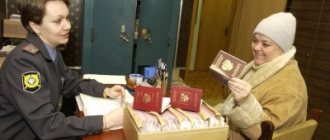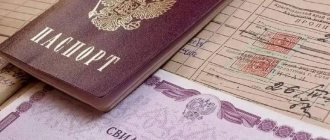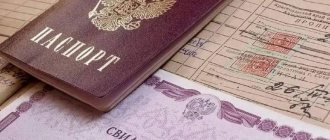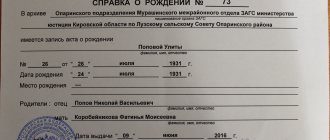The loss of loved ones and simply acquaintances is always terribly endured, especially if the death occurred unexpectedly and the relatives did not subconsciously set themselves up for a sad outcome (as in cases when a loved one or friend was sick, or lay in the hospital for a long time). Difficult days come, relatives are psychologically unstable, depressed and have difficulty accepting what happens after death. It is not surprising that at this time people are confused and do not understand what to do if a loved one has died, and which company or service to contact.
Below we will try to consider the procedure to follow if someone has died, but the main advice is to calm down, get yourself together and start filling out all the documents and preparing for the funeral, so that with a clear conscience you can release a relative, friend or just acquaintance into another world.
What to do when a person dies
The main thing for relatives who have suffered a loss is to contact the budget funeral service as quickly as possible, call a trusted agent from a reliable funeral home to the deceased, and entrust professionals with all actions related to the funeral and preparing the body for burial. The sooner the relatives get their bearings, the greater the chance of eliminating a meeting with illegal black funeral directors. If an unknown employee of a funeral agency does appear, you need to muster up courage and firmly refuse such services, trusting only legal, proven companies.
Terms and consequences of untimely deregistration
The legislation does not establish mandatory deadlines for deregistration of a deceased citizen. If relatives delay this process, they will not be held accountable. However, they will face other unpleasant consequences. For example, the amount of utility bills will be larger, since they are often calculated taking into account the number of registered persons. It will also be extremely difficult to sell an apartment, since buyers are afraid to purchase real estate on the territory of which other persons are registered.
If you found this page useful, please recommend it to your friends:
What to do if a person dies at home
Let's look specifically at what to do when a loved one dies at home:
- Contact a trusted company providing funeral services and write down all the details of the agent who will work with you, resolve problems and organize the burial.
- Call the ambulance (03) and the police department (02 or 112 for all services), prepare in advance compulsory medical insurance (health insurance policy), the main identification document (passport or birth certificate, yours and the deceased) and documents confirming the identities of everyone who was with the deceased at the time of his death.
- Upon arrival, medical workers will record the fact of death, draw up the necessary documents and send the body to the morgue. If suddenly the deceased turns out to be alive (it happens that coma or other conditions of the patient are mistaken for death), medical workers will provide first aid and take the patient to a medical facility.
- Employees of the budget funeral service, as well as representatives of legal private official funeral agencies, will advise you on further actions and protect you from black fraudulent schemes.
- Upon arrival of your funeral agent, check his data (identity card, passport or driver's license, as well as work ID and various constituent documents of the company) with the data that was recorded during the call to the agency. These actions will help make sure that you are dealing with a legal agent, and not a person who is profiting from death and has received information about people in trouble from unknown informants.
Getting a place in the cemetery
It is necessary to follow the procedure for contacting the cemetery administration. Documents that will be needed to obtain a plot:
- death certificate;
- statement from a relative.
The cemetery offers the services of local workers who will dig the grave. Relatives are given a site passport indicating its number and the deceased’s details. It is possible to get a place in the cemetery for free. This is possible if the deceased is registered in the city where the burial will take place. But relatives cannot influence the choice of site in any way. As a rule, it is provided in new cemeteries that are located outside the city limits.
When a person dies, what to do: basic actions
To organize on your own the funeral process, wake and other events related to the official farewell after death, you must remember that transportation of the deceased by a budgetary city service should be free of charge, and you must know which morgue the body will be delivered to and where it can then be picked up with all necessary documents.
Also, do not forget to do the following after contacting a funeral budget institution:
- open the windows if it’s cold outside;
- turn off the heating or move your body away from heat sources;
- cover the deceased with a sheet or other cotton cloth.
Afterwards, wait for representatives of the authorities, who will ascertain natural death, complete all the necessary documentation and send the deceased to the morgue.
Expert commentary
Khalzanova Svetlana Borisovna
Practical psychologist
Church rituals, like secular ones, can sometimes be regulated, depending on the circumstances. But, of course, these adjustments do not have to be significant in order to preserve the essence of the main actions. For example, a funeral service is held not only at the temple, but also in the cemetery, the funeral hall of the morgue - I did not name all the options. But the place is not as important as the essence of the ritual - the word of prayer, helping the soul through it. You can carry out steps step by step to preserve long-standing traditions, but remain indifferent to the fate of the deceased - this will not help his soul. It is much more important when, for example, a spouse who wears a wedding ring maintains love throughout his life and after death, and sincerely strives to help his deceased wife.
Basic operations when registering death
The algorithm of actions, regardless of where the person died, is as follows:
- Call a doctor who will register death. When a person dies of natural causes, a health worker will formalize everything himself, otherwise, if the cause is unclear, a representative of law enforcement agencies will be required. The police officer will draw up a protocol for examining the body and the possible crime scene, rule out possible violent influence on the deceased, and issue a document (protocol) with a preliminary indication of the cause of death. Please note that this document must be certified.
- Now you need to decide where to send the body. To send to the morgue, a special transportation is called, the representatives of which are presented upon arrival with a protocol and a medical form in which the fact of death is stated. The same service issues directions for obtaining a certificate. If you decide to embalm the body, contact the funeral service.
- On the second day after death, it is advisable to begin processing a medical document about death. Don’t forget to take with you the form that was issued by the doctor upon arrival, the police examination report, the medical card of the deceased and compulsory medical insurance (or VHI). The clinic at the place of registration or residence of the deceased (the medical institution to which he was attached) will issue a certificate for the deceased if he saw a doctor no later than 2 weeks ago; in other cases, a medical certificate is issued after a forensic examination or a pathological autopsy.
- A medical certificate from a clinic or from a forensic expert is submitted to the registry office, where a special form of certificate and a new certificate will be issued.
The funeral process: The rite of burial in a church or cemetery - how to organize
The rules for preparing for a funeral service in a church or cemetery are the same: they agree in advance with the clergyman to conduct the Rite of Burial. You need to have a stamped death certificate with you, but a medical one will do.
When the church doesn't have a funeral service
Even if the body dies, the soul remains. She is disoriented until she understands what happened. The prayers of relatives, the funeral rite - all this helps the incorruptible shell, but it is important to know whether the deceased was a true believer, whether he was a member of the church, otherwise he may lose the right to a funeral service. This ritual is not performed on certain people:
- suicides: a person makes a voluntary renunciation of the Lord, and therefore there is no need to perform a funeral service in order to deliver him from a forcibly imposed faith;
- criminals: if a sinner decides to start a new life, he must come to church, confess, take communion, perform the rite of Baptism, only sincere faith will help the soul change, and the repentance of such a person will bear fruit - forgiveness for sins, a funeral service is possible, and the Church does not specify what the criminal committed the crime, but accepts it;
- Gentiles: the ban on holding the funeral rite is due to the fact that such people can find peace if they are buried in a church of their confession or religion;
- unbaptized: those who have abandoned the Lord, Orthodoxy, do not receive the last farewell (funeral rite), their soul will not come to heaven purified by repentance, God’s forgiveness, but will remain in hell, where other sinners are.
Funeral service in the temple
A man died in a hospital - what to do?
If a relative dies in a hospital, it is necessary to contact a trusted funeral agency, as in the case when a person dies at home. But there will no longer be a need to call an ambulance, because... when a death is reported from the hospital, it means that resuscitation measures are no longer necessary and death is confirmed. The body is transferred to the morgue by the doctors themselves, as well as all the necessary information to the police department to exclude that the death occurred due to unnatural causes or due to medical error.
When calling an agency, do not forget to write down the agent’s details so that you can verify them upon arrival and do not pass on information about the deceased to people whom you did not turn to for help - most often these are scammers.
Social funeral: category of citizens, amount
When a funeral is carried out for a person belonging to a social category, the costs are borne by the state. Several groups are noted:
- people of retirement age (not working);
- people not of retirement age, but unemployed;
- stillborn babies, but provided that the gestation period is less than 154 days.
Regions in which additional payments can be made:
- Moscow: additional payment of 12,046 rubles if the pensioner is not working;
- St. Petersburg: payment for burial to the poor - 12,353 rubles, for cremation - 9,945 rubles.
Procedure if a relative dies in a medical facility
A person dies in the hospital - what to do next? We recommend following this algorithm:
- Contact official, legal, verified funeral agents.
- When an agency employee arrives, make sure that it is an official representative of the agency and follow him to the morgue. There you can pay for all related services and state fees for completing the necessary documentation.
- Provide the funeral agency with all the necessary information and entrust further post-mortem arrangements.
What not to do when a person dies
There are a number of actions that should never be performed if someone has died. Otherwise, there is a high probability of becoming a victim of illegal funeral services. To avoid trouble, after a person’s death you should not:
- answer calls, especially from undetectable phone numbers;
- talk to representatives of illegal funeral services that you did not call;
- allow any strangers into the house, even if they introduce themselves as employees of your funeral service, without presenting identification.
Traditional funeral meal menu. Features of the menu in the post
Main courses of fast food (containing animal fats):
- pancakes with milk;
- cutlets;
- borscht with meat;
- Fried fish;
- goulash;
- pies with cottage cheese, cabbage, meat.
The main dish is kutia - prepared with butter, honey, nuts, wheat or rice. Lenten food is required if a person dies while fasting. Then exclude meat, milk, butter, including. Fish and vegetable oil - these products are sometimes allowed.
Funeral meal with family
Be careful - scammers are on the move
Remember, if you let in uninvited illegal ritual agents, you will become their victim and the scammers, using special psychological techniques, will force you to overpay or pay for services that should be provided free of charge, or they will take the money and not organize anything, leaving you with grief and all the paperwork alone.
Do not become a victim at the hands of black agents, but trust the professionals from the MosGupRitual agency, who will take care of organizing the burial, wake and other farewell events after the death of your loved one, as well as advise and help in completing all the documentation as soon as possible. Call us, we work 24 hours a day, seven days a week.











